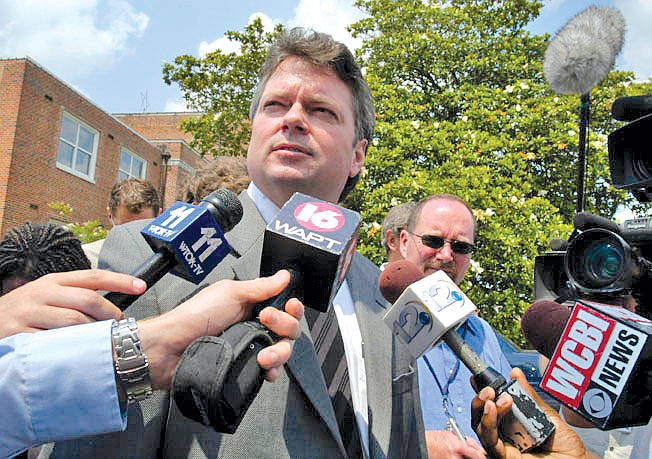Attorney General Jim Hood says the state's November sample ballot is illegal and will disenfranchise voters. Kate Medley
Wednesday, September 17, 2008
Gov. Haley Barbour took the fight over a sample election ballot to the Mississippi Supreme Court on Friday. Barbour appealed a ruling by Hinds County Circuit Court Judge Tomie Green that ordered a revised sample ballot displaying the U.S. Senate race between Ronnie Musgrove and Roger Wicker alongside other federal races.
The original sample ballot, which Barbour approved, lists the high-profile race, a special election to serve the remainder of former-Sen. Trent Lott's term, near the bottom of the ticket, below local school-board elections. Barbour and Secretary of State Delbert Hosemann, who designed the sample ballot, argue that past practice has been to list special elections at the end of the ballot.
"Democratic Secretary of State Eric Clark arranged the ballot in this manner, and Republican Secretary of State Delbert Hosemann arranged the ballot in the same way; I approved both of them," Barbour wrote in a Sept. 12 statement.
Pike County Election Commissioner Trudy Berger filed suit against Barbour and Hosemann hours after they approved the sample ballot on Sept. 9. She argued that the sample violated Section 23-15-367 of Mississippi Code, which requires that candidates for national office be listed first on the ballot.
Barbour's decision drew criticism from state Democrats, including former-Gov. Musgrove and Attorney General Jim Hood, who advised county election commissioners against following the sample. Each side has accused the other of partisan motives. Barbour, in a statement, called Hood's advice illegal and "brazen." Hood fired back with a statement calling on Barbour to "put away his political gameboard."
In under a week, the controversy attracted national attention and criticism. A Sept. 10 editorial in The New York Times called Barbour's sample ballot "a particularly cynical dirty trick." The Brennan Center for Justice, a non-partisan public-policy institute, sent a letter to Barbour, Hosemann and Hood, warning that a poorly designed sample ballot "undermines confidence in the electoral process." In addition, the letter warned, voting tends to decrease toward the end of a ballot, so placing the Senate race at the bottom could diminish voter participation in that election.
In granting declaratory relief on Friday to plaintiff Berger, Green stated that she could find "no justifiable reason" for moving the Senate race to the bottom of the ballot, "except to secrete the U.S. Senate Race or to confound the voters."
Barbour and Hosemann had argued that Miss. Code Section 23-15-367, which mandates placing all federal races at the top of the ballot, was "entirely silent" on where to list special-election candidates. In her ruling, Green maintained, "To the contrary, the statutes speak loudly about the special-election placement on the ballot."
Section 23-15-367 applies to the "arrangement of names of candidates, order of titles of offices, and printing of official ballot generally."
Another statute, Section 23-15-511, requires that special-election candidates be "clearly distinguished" from those for the general election. Green pointed out that placing a heading that reads "Special Election" above any special election race would satisfy the requirement without violating any law concerning the order of offices on the ballot.
"If there is 'silence,' then it comes in the absence of authority by (Barbour and Hosemann) arbitrarily moving a candidate for National Office outside the order and category mandated by the Mississippi Code," Green wrote.
Green heard arguments on the ballot case Thursday. Attorneys for Barbour and Hosemann filed a last-minute motion to dismiss at the hearing, arguing that because Hosemann had already sent out the sample ballots, Berger's request was moot.
Green had placed a temporary restraining order on the ballots' distribution Tuesday, after Berger filed her suit. The Supreme Court overruled that order Sept. 10 at Barbour's request, allowing Hosemann to distribute the sample ballots late Wednesday night.
Barbour petitioned the Mississippi Supreme Court to throw out the entire suit. No state court can issue a prohibition or injunction against the executive office, he argued. He went on to suggest that listing the Wicker-Musgrove race as Berger requested would constitute a change in voting procedure and thus a violation of the federal Voting Rights Act.
While the Supreme Court overturned Green's restraining order on procedural grounds, it did not rule on the merits of Berger's suit.
Green denied the motion to dismiss at Thursday's hearing and appeared skeptical of the two Republican's motives. "There evidently is something else going on where you want to take a senatorial race and put it at the back of the ballot," she told John Henegan, attorney for Barbour and Hosemann.
The judge appeared to grow exasperated as Henegan repeated Barbour's argument that the court has no subject matter jurisdiction to issue an injunction against the governor or secretary of state.
"All matters of governors and secretaries of state are subject to judicial review," she responded.
Barbour was not available for comment at press time.

Comments
Use the comment form below to begin a discussion about this content.
Sign in to comment
Or login with:
OpenID